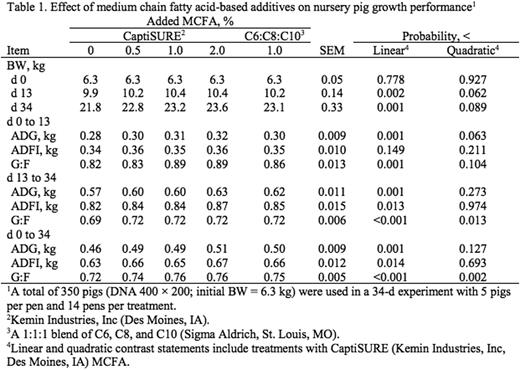-
Views
-
Cite
Cite
Lori L Thomas, Hayden E Williams, Jason C Woodworth, Mike D Tokach, Robert D Goodband, Steve S Dritz, Joel M DeRouchey, Dillon Mellick, 134 Evaluation of a medium chain fatty acid-based feed additive for nursery pigs, Journal of Animal Science, Volume 97, Issue Supplement_2, July 2019, Pages 72–73, https://doi.org/10.1093/jas/skz122.133
Close - Share Icon Share
Abstract
A total of 350 pigs (DNA 400×200, initial BW=6.3 kg) were used in a 34-d growth trial to evaluate the effects of a medium chain fatty acid (MCFA)-based feed additive in nursery pig diets. Following arrival to the nursery facility, pigs were randomized to pens (5 pigs per pen) and allowed a 4-d acclimation period. Thereafter, pens of pigs were blocked by BW and randomized to 1 of 5 dietary treatments (14 pens per treatment). Treatments were a dose response of 0, 0.5, 1.0, or 2.0% MCFA-based additive (CaptiSURE, Kemin Industries, Inc.; Des Moines, IA) as well as a treatment including 1.0% MCFA from a 1:1:1 blend of C6, C8, and C10 (Sigma Aldrich, St. Louis, MO). Treatment diets were formulated and manufactured in two dietary phases (d 0 to 13 and 13 to 34). Data were analyzed as a randomized complete block design with pen serving as the experimental unit. Overall (d 0 to 34), increasing CaptiSURE increased (linear, P ≤ 0.014) ADG and ADFI. Feed efficiency improved (quadratic, P = 0.002) with increasing CaptiSURE up to 1% of the diet with no benefit thereafter. As a result of the linear improvement in ADG, pigs fed 2.0% CaptiSURE were 1.8 kg heavier (P = 0.05) than pigs fed diets without MCFA at d 34. There was no evidence for differences between pigs fed 1.0% CaptiSURE and pigs fed the 1.0% MCFA blend of C6, C8, and C10 in phase 1, phase 2 or in overall performance. In summary, the addition of up to 2% of this MCFA-based additive in nursery pig diets resulted in linear improvements in ADG and ADFI. The MCFA-based feed additive also resulted in a similar improvement in growth performance as the C6, C8, and C10 MCFA blend when both were added at 1% of the diet.






